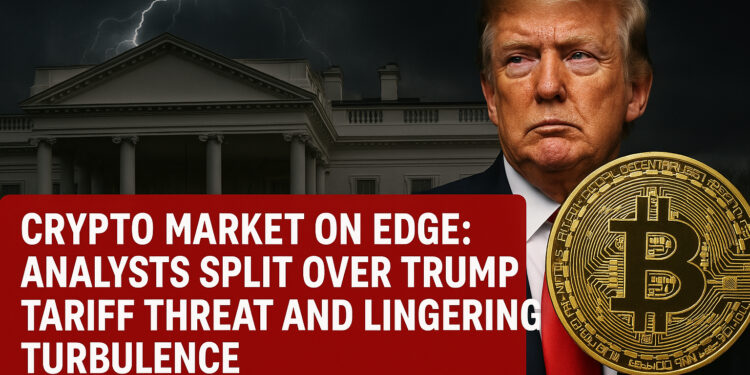- Bitcoin rallied from around US$84k to approximately US$88k, marking a 3% weekly gain.
- The market remains in Fear territory according to the Fear & Greed Index, though slowly trending upward.
- Tariffs and trade tensions are creating market uncertainty, with potential impacts on various economic sectors.
- Though analysts like Arthur Hayes suggest the Federal Reserve’s monetary policy is more crucial than tariffs.
- Options markets currently aren’t pricing in major risk events for the coming quarter, offering a cautiously optimistic outlook.
At the start of the week, it looked like Bitcoin might be waking up from its slumber when it started to rally from the US$84k (AU$133k) mark.
While it managed to gain roughly US$4k (AU$6.3k), the rally slowed by Tuesday, and the largest coin has been trading sideways since – still marking a 3% gain on the weekly scale.
Meanwhile, the Fear and Greed Index remains firmly in the ‘Fear’ territory, though it appears we’re slowly trending upwards.
The culprit responsible for the less-than-average market performance? Tariffs, most likely.
Related: Ghibli Memecoins Soar as AI Floods the Internet with Anime Aesthetics
Tariffs Target Allies, Spark Concerns of Wider Downturn
As analysts at Kaiko wrote in a recent report aptly named ‘Uncertainty Roils Markets’, Trump’s tariff threats have “sparked a massive sell-off across financial markets at the beginning of February, and fears of an escalating trade war have lingered ever since”.
In the past, Trump had mainly focused on China, but this time, it is close allies and neighbours like the EU, Mexico and Canada that are the targets – creating cause for concern.
While Trump had targeted China during his first campaign, the measures taken against North American trade partners were seen by many as extreme and potentially damaging to each national economy.

 Kaiko
KaikoAnalysts from The Kobeissi Letter tend to agree, writing in a recent post on Crypto Twitter that “these tariffs are going to have MASSIVE implications”.
Trump’s next round of tariffs is expected to affect car manufacturers by increasing the cost of cars being imported to the US but also auto parts used in US-made vehicles.
During Trump’s first term, he took pride when markets performed well. This time around, he doesn’t seem to care as much. It appears he has bigger plans for his tariffs, saying the market “could take care of itself in one day”.
While it’s unclear how long these tariffs will last, The Kobeissi Letter noted that if intimidation isn’t the main motive and the tariffs are here to stay, the market still hasn’t priced them in.
It’s The Trump Tariffs, Stupid. Or Is It?
But there are differing opinions on whether the tariffs really have the large impact that many fear.
Related: GameStop Stock Drops 22% Daily Amid Bitcoin Pivot, Sparking Investor Scepticism
Morgan Stanley’s Mike Wilson went on record to say that the Trump administration “doesn’t care” about markets, as per a Fortune report. He added that the market turning sour isn’t all about tariffs but rather due to “declining earnings revisions, stricter immigration policies, and the Federal Reserve’s stance”.
Well-known crypto figurehead, Arthur Hayes, seems to agree with Wilson, saying during a recent interview that “tariffs don’t matter anymore”.
The BitMEX co-founder argues that any effect is “transitory”, meaning any price increase would be short-term only and wouldn’t have a long-lasting impact on the economy.
Tariffs don’t matter anymore to Powell. And they shouldn’t matter anymore as crypto investors.

 Arthur Hayes
Arthur HayesWhat will have an impact, according to Hayes, is the US Fed’s monetary policy decisions.
If Trump does 50% or he does 2%, it doesn’t effing matter because we know that Powell will continue to provide the easing monetary conditions that we need to have our portfolios go up in value in fiat dollar terms.

 Arthur Hayes
Arthur HayesSome Cause for Optimism, as Investors Closely Watch Demand for ETH, BTC
And while Kaiko said that the macro-outlook remains “largely uncertain”, there is reason to be optimistic, especially when it comes to crypto.
For the first time in several quarters, options markets aren’t pricing in any major risk events in the coming quarter.

 Kaiko
KaikoThe analysts added that volatility inversions in BTC and ETH markets during 2024 – triggered by key events like spot ETFs and Bitcoin Halving – signalled potential short-term risks. As we head towards Q2, “the structure for both leading assets is normal, with no glaring risk events being priced in currently”.
Related: Risk Versus Reward Ratio For Bitcoin Never Better, Says Bitwise CIO
Despite this, the risk remains that we slip lower, and it will be crucial to see if demand for ETH and BTC returns. If it doesn’t, a “slip into backwardation could cause markets to move another step lower”.






















